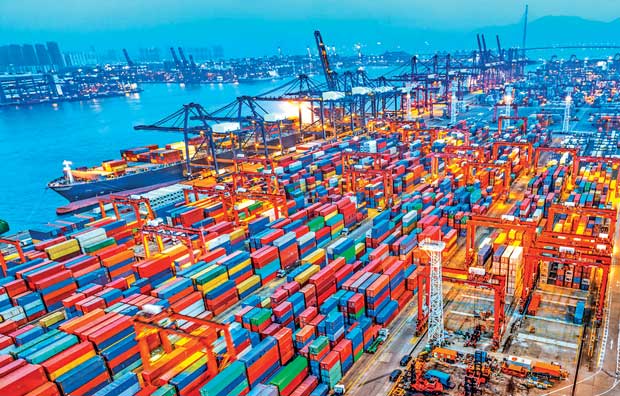Reply To:
Name - Reply Comment
Last Updated : 2024-04-26 09:45:00

 As hostility towards globalization and trade integration gain ground in Europe and in the US presidential debates, the World Trade Organisation (WTO) this week slashed the outlook for trade growth by one-third. The WTO has announced that world trade will grow this year at the slowest pace since the financial crisis and the great recession that followed. The estimate for 2016 trade growth was cut to just 1.7 percent from 2.8 percent from earlier this year – the weakest number since 2009. The estimate for 2017 was cut to between 1.8 – 3.1 percent, down from the earlier estimate of 3.6 percent. The organisation argues that anti-globalisation rhetoric and Brexit are key factors driving this bleak outlook.
As hostility towards globalization and trade integration gain ground in Europe and in the US presidential debates, the World Trade Organisation (WTO) this week slashed the outlook for trade growth by one-third. The WTO has announced that world trade will grow this year at the slowest pace since the financial crisis and the great recession that followed. The estimate for 2016 trade growth was cut to just 1.7 percent from 2.8 percent from earlier this year – the weakest number since 2009. The estimate for 2017 was cut to between 1.8 – 3.1 percent, down from the earlier estimate of 3.6 percent. The organisation argues that anti-globalisation rhetoric and Brexit are key factors driving this bleak outlook.
Slow growth, slow trade
In its latest World Economic Outlook Update, the International Monetary Fund (IMF) also echoed the worry around trade noting that “the slowdown in trade growth is remarkable”. A key explanation for the slowdown in trade is that the world economy simply isn’t growing as fast and therefore demand for goods around the world remains weak. In last week’s Trade Intelligence for the Private Sector (TIPS) column we noted that international shipping volumes have also seen a sharp slowdown and one of the factors that led to the collapse of the Hanjin shipping line. The IMF estimates that around 75 percent of the weak trade growth is explained by weak economic growth and weak investment.
Anti-trade rhetoric in US
Just a day prior to this announcement by the global trade body, the two candidates in the US presidential elections both demonstrated strong scepticism on the current global trade system, specifically the Trans-Pacific Partnership agreement, which is a hallmark of President Obama’s pivot to Asia strategy. While many presidential aspirants had expressed concern about particular elements of trade policy in the past, political commentators in the US have noted that no two candidates have so strongly agreed on the ill effects of expanded trade since the 1928 campaign that led to the election of Herbert Hoover. This is indeed an extremely worrying trend for the prospects of trade
integration, globally.
WTO alarm bells
The WTO has warned nations against resorting to anti-trade policies. WTO Director General Roberto Azevêdo said, “The dramatic slowing of trade growth is serious and should serve as a wake-up call. We need to make sure that this does not translate into misguided policies that could make the situation much worse, not only from the perspective of trade but also for job creation and economic growth and development which are so closely linked to an open
trading system.”
Azevedo is right. One of the key tenets of the rise of prosperity and globalization in the post-WW2 era was the substantial collapse of trade tariffs and the greater integration of trade around the world. In the last couple of decades, trade has grown 1.5 times that of the gross domestic product (GDP) growth, but this year it is forecast to grow at just 0.8 times – essentially indicating a reversal of globalization, for the first time since 2001 and only the second time 1982. With scepticism on globalization and the benefits of trade taking root, there are risks that leaders driven by political expediency will resort to raising trade barriers to shore up their own economies.
Policy imperatives
As anti-globalisation rhetoric rises and protectionism creeps into many countries’ trade policies, it is increasingly important for policymakers to address underlying reasons for people’s scepticism around trade. To reinforce popular support for trade integration and to grow the benefits of trade, policymakers need to address the concerns of workers as well as of industries that would have trouble adjusting to a highly competitive and often uncertain international trading environment. Skill-biased technical change is causing job polarization – where some workers are benefiting and others are losing out. Measures to make trade more inclusive – that is to ensure that the benefits of trade accrue to more people and that more people are able to participate in trade – are now more important than ever.
Lessons for Sri Lanka
These are salient lessons for Sri Lanka at a time when the country is proceeding with multiple free trade agreements and considering a substantial slashing of trade barriers. Sri Lanka’s structural reforms would necessarily need to be linked to the trade liberalization process – whether it is programmes to support retraining and reskilling, support for occupational mobility or measures to help firms reorient themselves, exit old industries and enter new ones with ease. There will be adjustment costs and there will be opportunities to benefit. But if not managed well, Sri Lanka could see scepticism towards greater trade and globalization, similar to what is simmering up in
the West.
(Anushka Wijesinha is the Chief Economist at the Ceylon Chamber of Commerce (CCC). This article is part of the ‘Trade Intelligence for the Private Sector’ (TIPS) initiative of the CCC, aimed at enhancing awareness on trade issues among the Sri Lankan private sector)

Add comment
Comments will be edited (grammar, spelling and slang) and authorized at the discretion of Daily Mirror online. The website also has the right not to publish selected comments.
Reply To:
Name - Reply Comment
US authorities are currently reviewing the manifest of every cargo aboard MV
On March 26, a couple arriving from Thailand was arrested with 88 live animal
According to villagers from Naula-Moragolla out of 105 families 80 can afford
Is the situation in Sri Lanka so grim that locals harbour hope that they coul